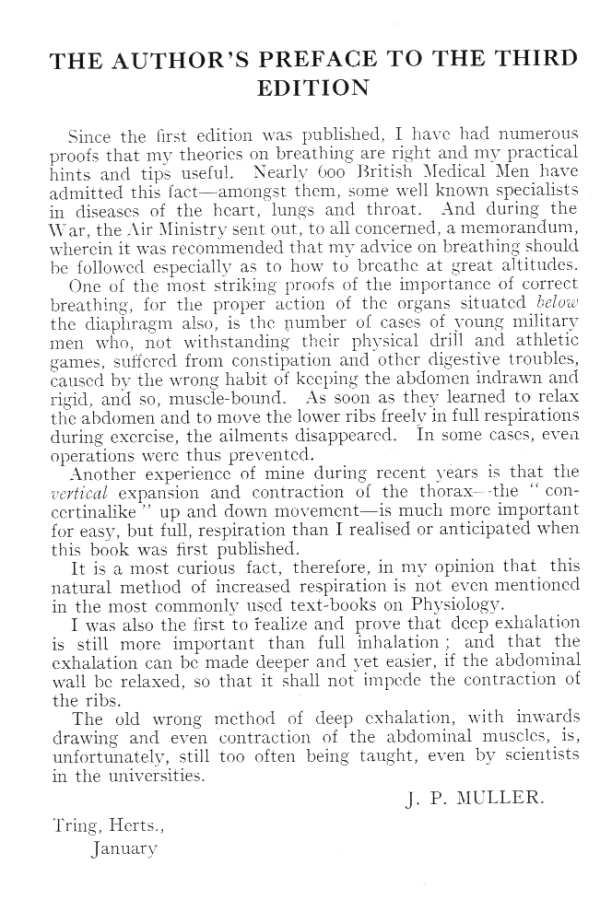mbs 007

THE AUTHOR S PREFACE TO THE THIRI) EDITION
Since the first edition was published, I liave had numerous proofs that my theories on breathing are right and my practical hints and tips useful. Nearly boo British Medical Men ]iave admitted this lact—amongst them, some well known specialists in diseascs of the hcart. lungs and throat. And during the War, the Air Ministry sent out, to all concerued, a memorandum, whercin it was reeommended that my advice on breathing should be followcd especially as to how to brcathc at great altitudes.
One of the most strikiug proofs of the importance of correct breathing, for the proper action of the organs situatcd beton1 the diaphragm also, is the number of cascs of young military men wno, not withstanding their physical drill and athletic games, suflcred front constipation and other digestive troubles, caiLsed by the wrong habit of kceping the abdomen indrawn and rigid, and so, muscle-bound. As soon as they leamed to relax the abdomen and to move the lower ribs freelo in fuli respirations during cxercise, the ailments disappeared. In soine cascs, even operations were thus preventcd.
Another experience of minę during recent years is that the rcrticai expansion and contraction of the thorax -the “ con-ccrtinalike ” up and down moeemcnt—is much morę important for easy, but fuli, respiration than I realised or anticipated when this book was first published.
It is a most curious fact, therefore, in my opinion that this natural method of inereased respiration is not evcn mentioned ut the most commonlv uscd text-books on Physiology.
I was also the first to realize and prove that dcep exhalation is still morę important than fuli inhalation; and that the cxhalation can be madę deeper and yet easier, if the abdominal wali be relaxed, so that it shall not impede the contraction of the ribs.
The old wrong metbod of deep cxhalation, with inwards drawing and even contraction of the abdominal musclcs, is, unfortunately, still too often being taught, even by scientists in the universities.
J. P. MULLER.
Tring, Ilcrts.,
January
Wyszukiwarka
Podobne podstrony:
mbs 006 THE AUTHOR’S PREFACE TO THE FIRST EDITION It may be a inatter of surprise to sonie that I sl
71722 system 11 THE AUTHOR’S PREFACE TO THE NEW EDITION The Exercises called " My System ” were
Artide 16 1. In the case of the applications for marketing authorisation refe
mbs 068 MY BREATHING SYSTEM I think I was the first author who prescribed exactly, in each single cx
82538 P1120985 Contents Preface to first edition Preface to currenc edition 1 Ultrasonography in the
REYIEWS 249 In his Preface to the second edition, the aut hor said, “Things should be viewed and dis
db603cd3e93fbf800b64119b80a79fbe Preface to this Edition ix Preface to the Second Edition XV I En
To?sire a?vil USA Today bcstsclling author of ^ To Beguile a Beast A The Finał Book in The Lege
Ludwig Von Mises Liberalism, In the Classical Tradition (1985) mmisjtt The Clascal Traditiontama w
więcej podobnych podstron